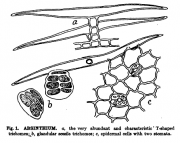Artemisia absinthium (leaf)
From AHPA Botanical Identity References Compendium
(Difference between revisions)
m (moved Absinthium vulgaris (leaf) to Artemisia absinthium (leaf)) |
|||
| Line 1: | Line 1: | ||
| − | {{ | + | {{Microscopy | source=Schneider, A. (1921) The Microanalysis of Powdered Vegetable Drugs, 2nd ed. |
| mainimage=Microanalysis_powdered_vegetable_p_200_google_ver_absinthium_figure.png | | mainimage=Microanalysis_powdered_vegetable_p_200_google_ver_absinthium_figure.png | ||
| description=Wormwood (leafy tops) (''Absinthium vulgare'' Lam., Compositae.) | | description=Wormwood (leafy tops) (''Absinthium vulgare'' Lam., Compositae.) | ||
Revision as of 19:19, 30 December 2011
|
Cite error: <ref> tags exist, but no <references/> tag was found
